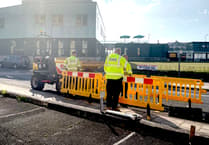DARTMOOR National Park Authority came in for another caning on the second day of the inquiry. It withdrew all its proofs of evidence, having already withdrawn its objections the previous day.
Then Trevor Blaney, representing Airwave, requested that the recommendation of a meeting between the chief planner, lawyer, authority chairman and planning officers on November 7, be known.
Graham Gover (DNPA) said Mr Blaney was claiming the authority was hiding behind closed doors. That was not the case. The meeting was to receive a report of the steps already taken by officers.
The inspector, Martin Pike, said he thought it was a reasonable request because it left an area of doubt.Mr Gover said instructions were being taken as to whether it was permissible and lawyer Christopher Walledge emphasised the report was in part two for legal professional privilege.
'If you want that, you are requiring the authority to waive its privilege,' said Mr Walledge.
After Thursday's lunch recess, Mr Gover produced the document which stated that members were recommended to note the decision to withdraw from proceedings.
Mr Blaney immediately countered: 'As I expected. It was quite clear the decision was to withdraw, plain and simple. It was to provide a watching brief and withdraw from the appeal without delay.
'The only honest way forward is for Mr Gover to come clean and tell the inspector the authority is withdrawing and not the fiction he came out with yesterday,' he stated.
The reason Dartmoor National Park Authority withdrew its objections was because of the late submitted evidence from Airwave, Graham Gover told the public inquiry on Friday.
Applying for costs, he said members had expressed concerns in September that an Airwave representative was unable to answer some of their questions.
An officer had advised that the visual impact would be limited and, in his view, was considered acceptable, but members formed their own opinion.
'It is not unreasonable or unusual for members to have a different opinion to that of officers.
'The authority met its obligation on time with the evidence that substantiated refusal. It has never questioned the need, but policy allows it to consider whether a structure is necessary,' he said.
Mr Gover said that the appellants' suggestion that the planning director had made up a work of fiction was 'a most serious allegation'.
'The director deliberately wrote the reason for refusal knowing that the decision notice could well be subject of scrutiny. It is a serious allegation that he was attempting to mislead. He made an honest account of the reasons for refusal. The director should be vindicated, not vilified as he has been,' he said.
Mr Gover said any costs should be excluded from October 21 because the authority had said it was withdrawing and it should not be penalised for the appellants' lack of frankness.
Applying for partial and full costs for Airwave, Trevor Blaney maintained the authority had put up two alternative sites for the Tetra mast, knowing they were not available.
He said the drive trials on the two had cost £18,000, but what was the point of commissioning them on sites that were unavailable?
'Imagine the costs an operator would have to find if he had to carry out visual impact assessments on alternative sites that were not available,' he pointed out.
Mr Blaney alleged that the authority's solicitor, Christopher Walledge, had 'in an aggressive manner' tried to stop planning consultant Ian Waterson from seeing documents he had requested.
'It is now the subject of a complaint from Mr Waterson against Mr Walledge,' he said.
He further maintained that the evidence was late because Mr Walledge took five months replying to correspondence.

-Councillor-Brazil-Councillor-Hodgson-Councillor-Leadbetter-Councillor-Fife.png?width=209&height=140&crop=209:145,smart&quality=75)

